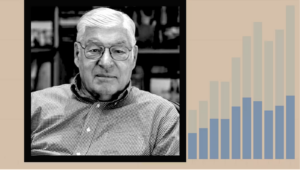Details Are Part of Our Difference
Embracing the Evidence at Anheuser-Busch – Mid 1980s
529 Best Practices
David Booth on How to Choose an Advisor
The One Minute Audio Clip You Need to Hear
Author: Nell Schiffer
Hey Hill, should my social security change how I invest?

At Hill Investment Group, we’ve found that when a few clients ask similar questions, many more likely share the same curiosity. To better serve you, we’ll periodically feature this “Hey Hill” segment in our newsletter, addressing common client questions and explaining our perspective. To submit questions for future newsletters, email us at service@hillinvestmentgroup.com.
Hey Hill, should my Social Security income change how I invest?
Many investors underestimate how significantly Social Security can impact their financial plans. Rather than viewing it merely as a government benefit, think of Social Security as what it truly is—a guaranteed, inflation-adjusted income stream, similar to a bond within your portfolio.
This means your actual fixed-income allocation may be higher than you’ve realized. As a result, incorporating Social Security into your planning can allow you to take on more investment risk than initially assumed, potentially enhancing your portfolio’s long-term growth.
Clients often ask us:
– Should I reduce my stock exposure as I near retirement?
– How much investment risk is appropriate?
– How should I factor Social Security into my overall investment strategy?
Reframing Social Security as a reliable income source can help you feel more confident maintaining a higher equity allocation, improving your portfolio’s potential for growth over time.
Want to discuss how this concept applies specifically to you?
We’re here to help. Reach out at service@hillinvestmentgroup.com.
A Legend Passes
The investing world recently lost one of its quiet pioneers, Mac McQuown. While his name may not be widely recognized outside our industry, his influence runs deep. A trailblazer in modern investing, Mac’s visionary contributions laid the groundwork for the strategies many investors benefit from today. As David Booth, Co-Founder of Dimensional Fund Advisors, aptly noted, Mac was a true transformer in the field. [Click the quote to read Dimensional’s tribute.]
“Catalyst” is the keyword. There are so many useful nuggets in the attached article in the Financial Times that you’ll be better off reading it. In a short space, you will learn the history of evidence-based investing, the first index fund (Mac’s creation), the birth of many future Nobel Laureates, and their impressive connection to Dimensional, Blackrock, and other global finance leaders.
If you want to know and understand the recipe you’re investing in when investing with Hill, this is one of the better shortcuts to taking the long view you’ll ever read.
Keep It Simple

At conferences, I often hear experts advocate for private and alternative investments, claiming they’re essential for our largest and most sophisticated clients. They argue that these exclusive opportunities are what the wealthy truly want. These voices are growing louder, and the products they pitch are becoming more prevalent.
At Hill Investment Group, we take a different approach. We continue to value simplicity and transparency, regardless of how much money our clients have. We avoid complex, illiquid, and expensive options, even when others say they’re necessary. Our guiding question is this: once the marginal utility of wealth kicks in—when each additional dollar has less impact on your life—why take on added risks?
You can achieve extraordinary success by embracing what we call a “passive-aggressive” approach:
- Own global capitalism: Invest in broad market ETFs.
- Tilt toward premiums: Focus on factors identified by research to enhance returns.
- Rebalance regularly: Sell what’s done well, buy what’s lagged.
- Tax loss harvest: Capture losses to offset gains.
- Let it compound: Give your investments time to grow.
- Keep investing: Stay committed over the long term.
- Ignore the noise: Focus on your strategy, not the headlines.
By sticking to these principles, you can build and preserve wealth without getting caught up in the complexities that others might push.
Keep it simple!


